Learn how to clean battery corrosion in 6 simple steps — all your toys and electronics will work like new again!
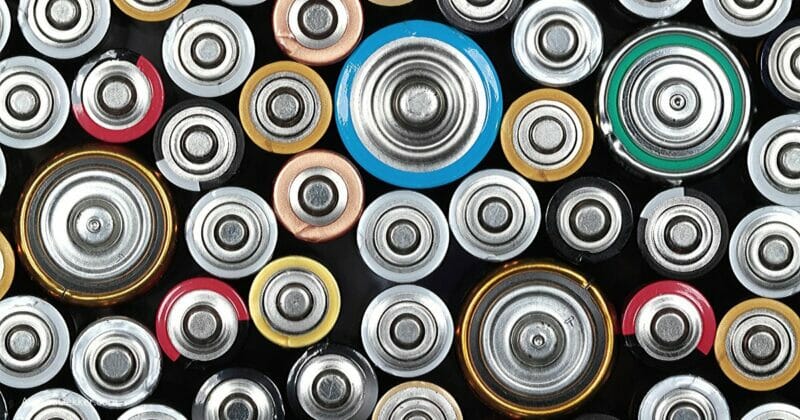
Have you ever wondered how to clean battery corrosion from your favorite toys and electronics?
Or maybe you didn’t even realize you COULD clean corroded batteries!?
Yes! It is possible (and quite simple) to clean mild to moderate battery corrosion from your favorite toys and electronics!
Since we often give our children used toys as birthday and Christmas gifts, and since I regularly buy kids’ items on Craigslist and Facebook, it is not uncommon for me to come across a fair amount of corroded battery compartments.
Thankfully, I learned how to remove battery corrosion a few years ago. As a result, we’ve been enjoying even more second-hand bargains!
If you have any toys or electronics with corroded battery compartments, test out my tips, and bring new life back to your “old” treasures!
How To Clean Battery Corrosion
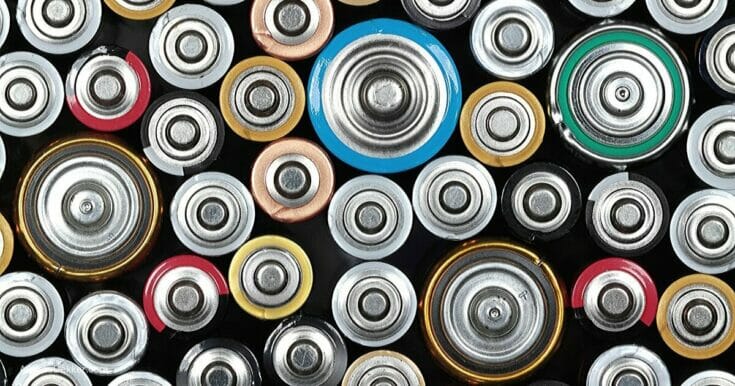
Have you ever wondered how to clean battery corrosion (or even if it's possible to do so)? Yes, it is possible to clean mild to moderate battery corrosion -- and as I'll show you, it's actually really simple too!
Materials
- Paper towels or cleaning rag
- Cotton Swabs
- Baking soda
- Water
Instructions
STEP 1: Remove and discard old batteries.
In almost all cases of battery corrosion, you'll need to dispose of the old batteries.
In my experience, it's fairly easy to clean the corrosion off the toy or other electronics, but you can't really "clean" it off the batteries.
STEP 2: Wipe out any loose chunks.
Sometimes you won't need to do this, but if there are any loose chunks of corrosion, I try to wipe those out with a damp paper towel (or blow them out with a can of compressed air).
STEP 3: Make a paste of baking soda and water.
You'll only need a teaspoon or so of baking soda and just a few drops of water.
I use a cotton swab and a small bowl to mix it into a paste.
STEP 4: Rub the paste onto the corroded areas.
Using the cotton swab, simply rub a small amount of the baking soda paste on and around the corroded area until the corrosion starts to rub off. Use new cotton swabs as necessary.
STEP 5: Wipe out excess with a paper towel.
Once you have the corroded area mostly cleaned out, use a damp (almost dry) paper towel to wipe the area. Then let it air dry before putting new batteries in.
STEP 6: Test it with new batteries.
Put new batteries in the unit and test to see if it works!
Notes
There have been a couple of times when this cleaning method has not worked for me, but for the most part, once I put new batteries in, the item works just like new again!
Recommended Products
As an Amazon Associate and member of other affiliate programs, I earn from qualifying purchases.
Even more so now that I don’t have to skip over items with corroded battery issues!
I know my quick cleaning tips won’t work for every case of battery corrosion, but considering the process only requires a few minutes and a tiny bit of baking soda, it doesn’t hurt to try!
BONUS TIP: If you plan to give a gift that requires batteries… include a pack of extra batteries! I know it will be appreciated 🙂
What about you… have you ever “magically” fixed a favorite toy or game by removing battery corrosion?
Do you have any other tips to clean battery corrosion?
Follow me on Instagram for more quick cleaning tips like this one!

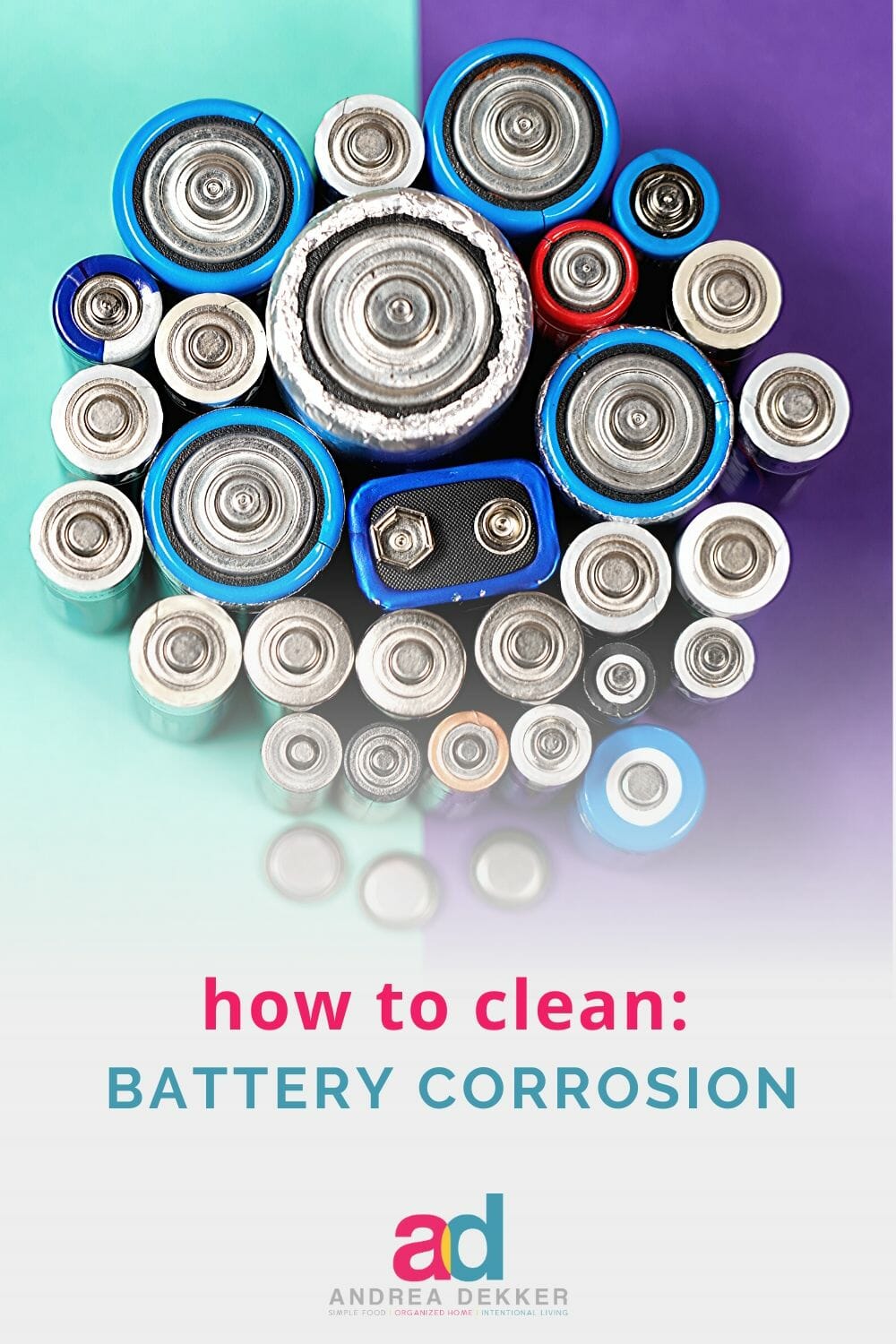
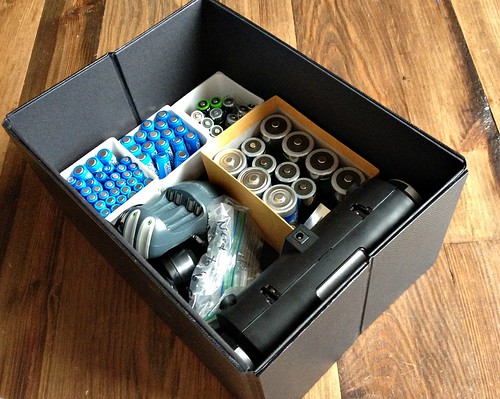





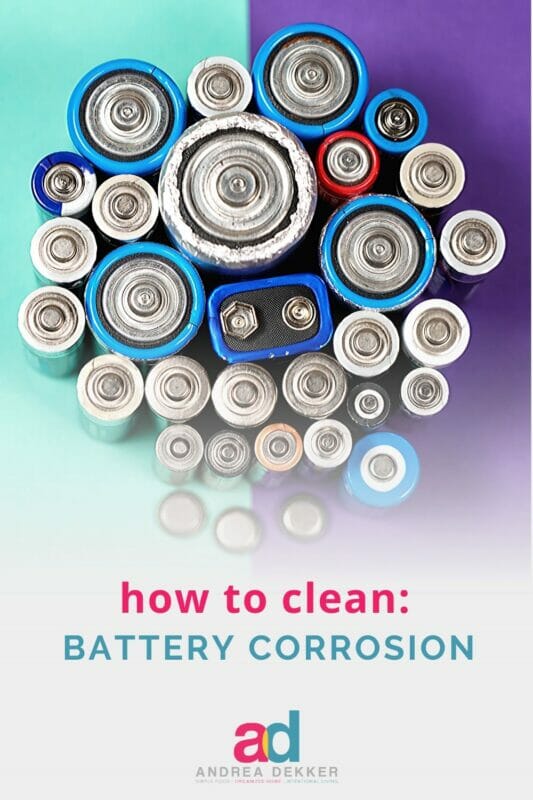
Paul Bartells says
Hi, Andrea. Have you had any experience in rescuing a device where the batteries are in a metal tube and won’t come out. I have a D-cell Mag-lite LED flashlight in that condition. I’ve considered dripping some vinegar into the tube to dissolve the corrosion, but I don’t want to damage the LED circuitry. Any thoughts?
Andrea says
sorry Paul, I don’t have a great answer for his. I’ve never tried it (or had a reason to try it).
Tom says
“There have been a couple of times when this cleaning method has not worked”. That’s because baking soda is the completely wrong thing to use on alkaline battery corrosion. Baking soda is alkaline, and so are the ALKALINE batteries. (It says it in the name.) You need an acid, not more alkaline. Use lemon juice instead.
Thomas King says
Just the opposite. Baking soda is for dissolving corrosion on CAR batteries, which leak acid.
But alkaline batteries leak, well, alkaline. To dissolve that, you need an acid like vinegar or lemon juice.
Baking soda = Cleans car batteries
Lemon = Cleans alkaline batteries
Jim says
Can baking soda be used in place of baking powder ?
Andrea says
Hi Jim, yes the recipe calls for baking soda — that is what you should use!
Jim says
But the question should have been “ can baking powder be used in place of baking soda ? “
Andrea says
I’ve never tried baking powder — and I’m honestly not sure it would have the same effect. Baking soda neutralizes acid (and battery corrosion is acid). Baking powder, on the other hand, has acid in it already — so it wouldn’t be nearly as effective.
Of course, you can give it a try as an experiment!
Ralph Davy says
my battery is stuck in a flash lite. is ther any liquid that works?
Andrea says
sorry Ralph, I’m not sure about this!
Tom says
Do noy usebaking powder. It contains baking soda *plus” an acid that neutralizes the baking soda. You wany baking soda only.
sue says
If there is build up on the metal connections on the toy or device, I always use a bit of sandpaper to clean it off, ie an emory board. I usually always have a bunch of them lying around.
Sue in NJ
Tina says
Thank you for this timely blog post! I thought I had removed all of the batteries from ALL of the musical Christmas things last year, but overlooked my son’s “favorite” musical snowman. I almost threw it out, but thought I’d Google to see if it could be saved. And then I read this title! You just saved Christmas! Lol
Andrea says
oh good — glad I could “save Christmas”! haha!!!
Karlyn Nance says
This is a great tip that I will try, but my comment is a safety tip regarding storing those 100 batteries! The picture of the batteries in the cardboard boxes caught my eye, and I wanted to share my experience. Like you, I use repurposed cardboard boxes for storing almost everything! After sorting & placing my batteries in their boxes and then in my desk drawer, I started noticing a hot smell coming from the drawer. Upon closer examination, I found that one of the batteries felt quite hot to touch. Then I noticed it had been placed in a cardboard jewelry box that had a metallic lining, and the terminals were in contact with this lining! It was probably only a few minutes away from igniting this cardboard box or possibly exploding! Lesson learned: do not store batteries where the terminals can contact any conductive material, including metallic linings, metal containers, metal objects in the same container, coins, or the terminals of other batteries.
Andrea says
thanks for the tip — no metal in our box!
Linda says
The way you store your batteries is great because all the contacts are facing up. If they come in contact with each other…especially stronger batteries like Ds…that there can be a problem. At least that is what our Fire Chief told us when he gave a talk to our neighborhood.
Merry Christmas!
pw says
this works on car batteries also, and a good time to check them is now.you can mix paste of baking soda and water and use old toothbrush to scrub the battery then if outside just poor clean water over it, you don’t want that on your garage floor. Then take Vaseline and rub it on the battery connections I use cotton swab or paper towel. Don’t need a lot. Provides very good connection for winter.
Andrea says
good to know! I was actually wondering if it would on car batteries!
Liane says
This good advice applies to car battery terminals as well. Check them when you check your oil and steering fluid.
Since we have a motorhome as well as a house both replete with flashlights, remotes, more remotes and other devices that use batteries like my LED candles, I always remember to take all them out after we park for the winter. Here in California where we live it only rains, and that seems to not be happening this year, but we have to drive through snow to go anywhere north or east. That’s scary so we stay home and park her. Last year one candle was overlooked and the battery leaked. It needed to be discarded but also the corrosion on the metal battery holders was pretty bad. I used a piece of emery cloth to polish the contacts.
I had to buy new nickel metal hydride batteries the other day to replace old nickel cadmium ones. I was curious about the difference and I found this site which I saved because it’s really informative. Knowledge is power.
https://sciencing.com/difference-between-alkaline-nonalkaline-batteries-8297163.html
Li
Jenny says
That was interesting but still a little over my head. And he says table salt is potassium, where I always thought it was sodium, so now I’m wondering.
Liane says
Jenny you are correct. I wonder if that was an editing error. I have a degree in biochemistry which should have enabled me to catch that. I just skimmed over that paragraph. My bad.
Coincidentally potassium chloride is that horrible tasting stuff in low sodium food. It’s also given as an oral medication to people who take certain diuretics that cause them to lose potassium.
Holli says
Most batteries are alkaline (basic) batteries, so I have used vinegar (acid) on a q-tip with much success. Keep this in mind if the baking soda trick doesn’t work. Best save was a second hand Loving Family doll house that was no longer lighting up or playing the sounds. The house is well loved in our house now!
Andrea says
good tip… thanks Holli!
Tiffany Manning says
Will Coke work if so how do I go about doing it. I have a fluorescent camping lateen that takes 8 D’s batteries
Andrea says
I can’t personally speak on this… but I’d probably stick with the baking soda if you have it.
Tom says
Coke contains phosphoric acid, which os an excellent rust remover. Its best if the part can soak in the coke for 30 minutes.
Jen says
My kids are grown now but we still use lots of batteries! The cheapest place to buy them, HANDS DOWN, is Sam’s, Costco, BJs, etc. I always buy the store brand to save money, but even the name brands (Energizer, Duracell etc) are SO MUCH CHEAPER!
Merry Christmas!
Andrea says
yup, we get lots of batteries from Costco. Also, Menards almost always had some type of rebate on AA and AAA that makes them almost free. However, that doesn’t work on 9V, C, or D batteries
Ann says
O bummer! I found the perfect (used) Christmas gift but when I got home, it was corroded and I couldn’t get it to work. I returned it and they threw it away. I wish I had tried this as it is EXACTLY what I wanted to give and I haven’t found another!
Andrea says
booo… that stinks! Sorry you missed out on your perfect gift. You’ll know now for next time!